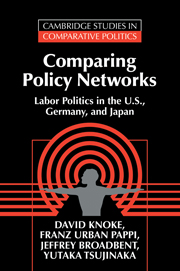Book contents
- Frontmatter
- Contents
- List of tables and figures
- Preface
- Acknowledgements
- 1 Policy-making in the Organizational State
- 2 Three Labor Policy Domains
- 3 Finding Domain Actors
- 4 Organizational Policy Interests
- 5 Policy Webs: Networks, Reputations, and Activities
- 6 Fighting Collectively: Action Sets and Events
- 7 Exchange Processes
- 8 Power Structures
- 9 Variations on a Theme of Organizational States
- Appendix 1 Legislative Procedures in Three Nations
- Appendix 2 Labor Policy Domain Organizations by Type
- Appendix 3 Cluster Analyses of Labor Policy Domain Issues
- Appendix 4 Labor Policy Domain Legislative Bills
- References
- Index
7 - Exchange Processes
Published online by Cambridge University Press: 05 June 2012
- Frontmatter
- Contents
- List of tables and figures
- Preface
- Acknowledgements
- 1 Policy-making in the Organizational State
- 2 Three Labor Policy Domains
- 3 Finding Domain Actors
- 4 Organizational Policy Interests
- 5 Policy Webs: Networks, Reputations, and Activities
- 6 Fighting Collectively: Action Sets and Events
- 7 Exchange Processes
- 8 Power Structures
- 9 Variations on a Theme of Organizational States
- Appendix 1 Legislative Procedures in Three Nations
- Appendix 2 Labor Policy Domain Organizations by Type
- Appendix 3 Cluster Analyses of Labor Policy Domain Issues
- Appendix 4 Labor Policy Domain Legislative Bills
- References
- Index
Summary
In 1989 the U.S. Congress passed the first minimum wage hike in a decade, from $3.35 to $4.25 per hour over two years. The act also included a lower three-month “training wage” for teenagers. A more generous wage increase proposed by labor unions was defeated through hard lobbying by the Minimum Wage Coalition to Save Jobs, whose partners included the U.S. Chamber of Commerce, major corporations and small businesses, and 150 trade associations. The National Federation of Independent Businesses mobilized its half-million members to deluge their representatives with letters and telegrams describing the potential job losses in each congressional district. President Bush's earlier veto of a higher rate bill had forced the compromise that gave business firms a lower pay scale (CQ Almanac, 1989). The outcome of this policy fight illustrates the substantial impact of organized interest groups on national political economies. Explaining how organizations affect public policy decision is the ultimate objective of this chapter.
We confine our research to the impact of interest groups in civil society on legislative decisions. We realize that the relative importance of the national legislature in the total policy-making system varies from nation to nation. For instance, in Japan the ministries have a much stronger hand in making the content of legislation than do the departments in the U.S. And the Japanese ministries also have greater latitude in creating regulations and interpreting laws. Therefore, focusing our comparisons just on legislative politics produces a somewhat unbalanced analysis.
- Type
- Chapter
- Information
- Comparing Policy NetworksLabor Politics in the U.S., Germany, and Japan, pp. 152 - 188Publisher: Cambridge University PressPrint publication year: 1996



